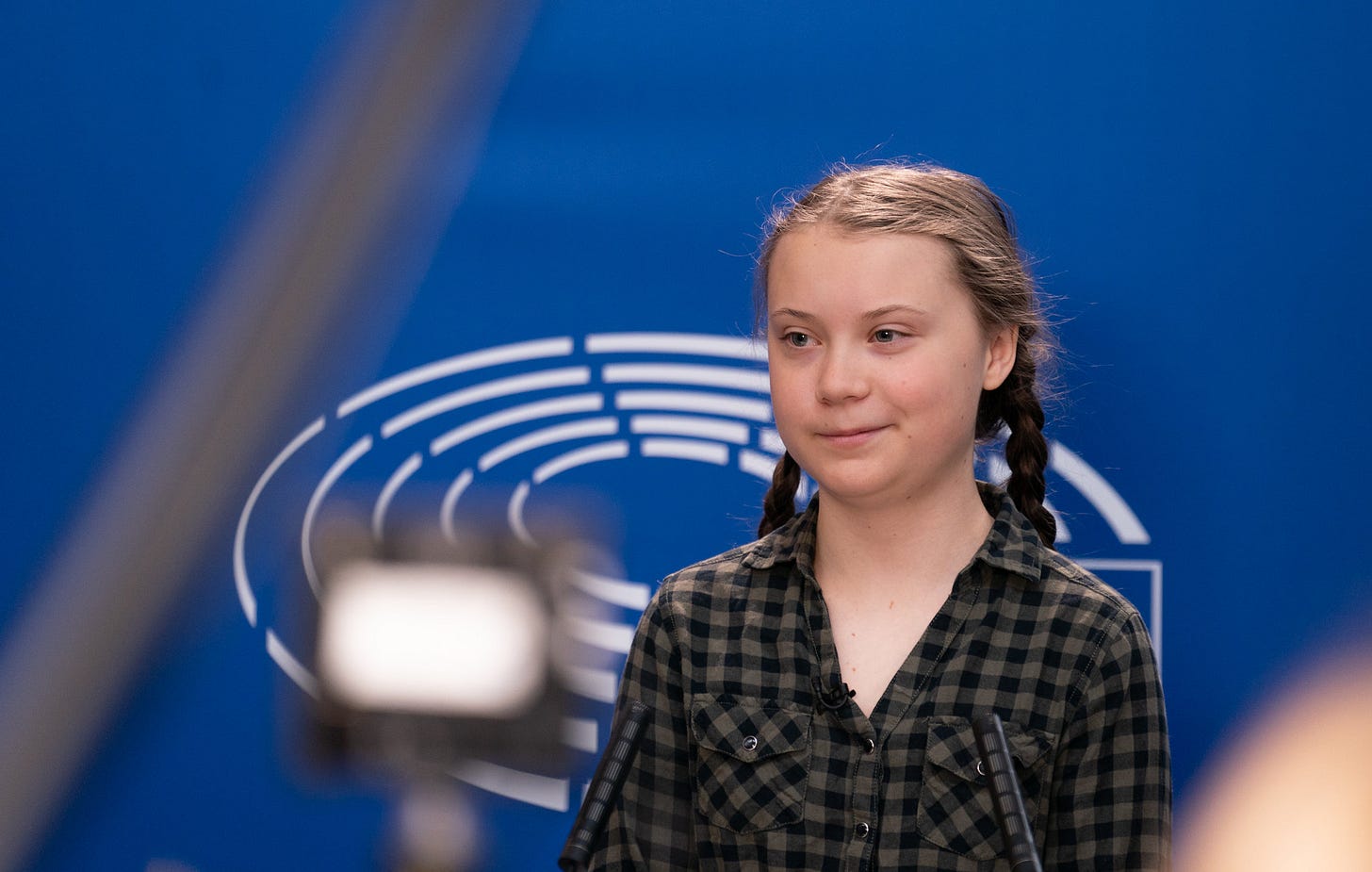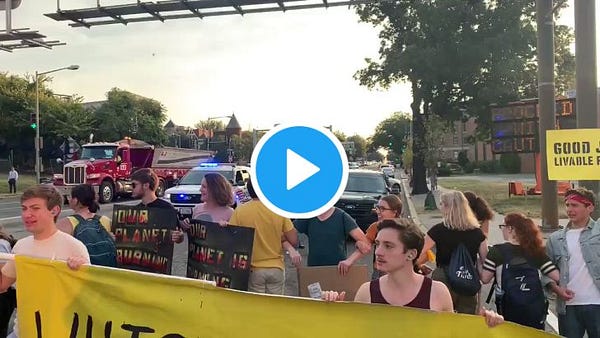Republicans clash with Greta Thunberg.
Plus, a reader asks whether marches and protests actually work.
Today’s read: 8 minutes.
How 16-year-old Greta Thunberg is causing a political showdown, what’s the point of marching and American drone strikes that are killing civilians.

Photo: European Parliament / Flickr
Update:
New reporting from The Washington Post suggests that Trump told his acting chief of staff, Mick Mulvaney, to withhold $400 million in military aid for Ukraine less than a week before the phone call where Trump pressured Ukraine’s president to investigate Joe Biden’s son. The news is being interpreted by some as the smoking gun evidence to prove Trump was leveraging foreign aid to pressure a world leader into investigating his top political rival. In the wake of the news, the dam is breaking on calls for impeachment as Democrats in swing states are now embracing the idea they need to remove Trump from office. Read.


Rut roh.
We’re all going to be serving robots in five years:
What D.C. is talking about.
Greta Thunberg. The 16-year-old climate activist from Sweden has been all over the news. First, she met former President Obama. Then she spoke before Congress and sparred with Republican members of Congress. Then she gave a speech at the UN’s Climate Action Summit. Thunberg told a room of world leaders that they have “stolen” her dreams and her childhood with empty words on how they would act to rescue the environment. This all comes shortly after she completed a trip across the Atlantic Ocean in a sailboat. Thunberg, who has Asperger’s, has become a hero for people on the left and a villain of the right. Her speech set off waves of criticisms, attacks and support from people across the political spectrum.
What Republicans are saying.
Why are we listening to a 16-year-old? The prevailing argument on the right is that Thunberg is a child and nobody should be paying any mind to her, let alone giving her time with former presidents or front-page coverage. But as positive stories about her continue to spread, the attacks got uglier. Michael Knowles, a political commentator from The Daily Wire, went on Fox News and called Thunberg a “mentally ill Swedish child” and said she was being taken advantage of. Fox News quickly apologized for Knowles’ comment, calling it “disgraceful,” but then it’s primetime host Laura Ingraham compared her to Children of the Corn just hours later with no repercussions. President Trump shared a video of Thunberg’s emotional, desperate plea for action on climate change and mocked the girl, saying, “She seems like a very happy young girl looking forward to a bright and wonderful future. So nice to see!” When Democrats and liberals predictably reacted with shock and disgust, pointing out that she is a 16-year-old girl who is trying to save the planet, conservatives responded by reminding everyone how the teenaged boys from Covington Catholic High School were treated. Another talking point is emerging, too: that climate change activists telling kids they are going to die if something isn’t done amounts to “child abuse.” This argument is now being popularized on the right and repeated across media circles (more on this below).






What Democrats are saying.
The right is showing its true colors. Greta Thunberg isn’t just a kid, but she’s a kid who believes in her message. And as someone who is going to be on the planet much longer than most of the people attacking her, she has a right to speak about how she wants her future to look. Also, it’s fine if Republicans don’t want to take the words of a 16-year-old seriously — but who will they listen to? Scientists at the government’s own National Oceanic and Atmospheric Administration (NOAA) say the earth’s temperature is rising, the water temperature is rising, the polar caps are melting and carbon dioxide is filling the air. NASA says the same — and each are predicting wide-reaching catastrophic environmental impacts that are 50 to 100 years away, while both have also noted the ways the environment is already changing. So if you won’t listen to scientific experts and you won’t listen to a kid pleading for her future, who will you listen to?






My take.
One of the most interesting stories I’ve ever written is actually about kids like Greta. A few years ago, I was tipped off to a story about a group of 20+ children, all under the age of 18, who were filing a joint lawsuit against the United States government and President Barack Obama for their role in climate change. The lawsuit alleged that by continuing to incentivize fossil fuel companies in America, the government was threatening their life and liberty. Several of the kids lived in coastal cities, flood zones or areas that experienced high levels of severe weather. Their argument was simple: climate change was going to destroy their property, climate change was caused by greenhouse gas emissions and the U.S. government played a part in covering up the impacts of emissions and continues to do nothing to regulate them. The lawsuit is still moving through federal courts and the activists and lawyers behind it believe firmly that they can prove, in a court of law, that there is overwhelming evidence climate change is being caused by people and will have devastating impacts for the country. Those kids I interviewed were genuinely kind, empathetic, intelligent, caring, engaged and passionate children. I imagine they are a lot like Greta. Seeing her take on so much vitriol and hatred for taking the words of experts seriously is sad and distressing, and I simply wish we lived in a world where people could either elevate and support her or challenge her respectfully on the merits rather than call her a “mentally ill Swedish child” or whatever the hell else has been said.
For what it’s worth, I also don’t think we should be taking guidance from 16-year-olds (generally speaking). But let’s step back and remember that Greta’s activism only exists because the same people dismissing her now have also been dismissing climatologists, NASA, the NOAA, etc., for decades. After years of the public not listening to actual scientists, activists like Greta have popped up to try and spread warnings about climate change. Now those same people are dismissing her because she’s a kid and not an actual scientist. As for the argument that this is “child abuse,” it’s absurd on its face. Most of the kids I know involved in climate activism are empowered and exhilarated by their role in activism. They’re given a community and pushed to educate themselves for public debate. They are excited about the momentum they’re getting. They are not victims of child abuse. And, as I noted on Twitter, calling it child abuse is a gross way to minimize actual abuse like molestation, physical violence, or emotional abuse on children. Even more, if conservatives really believe this is child abuse — which I genuinely don’t think they do — then wouldn’t the logical next step be imprisoning the abusers? Certainly, child abusers shouldn’t be allowed to roam free and go on television to promote their abuse. But no, most conservatives would never advocate that climate activists go to jail because they don’t actually think what they’re doing rises to child abuse. It’s just punchy (and dangerous) rhetoric.

Your questions, answered.
Reminder: Tangle is about streamlining the information news consumers want to know. My job is to simplify and condense the news so you can stay informed without having to wade through story after story. If you have a question you want answered, you can simply reply to this email.
Q: Marches, what are they good for? Especially comparing the year-round presence of American protests with those in Hong Kong and Puerto Rico which led to tangible results. If thousands of Americans chanting and waving banners in the streets was going to get the White House or Congress to do anything, wouldn't it have happened by now?
- Bryan, Washington D.C.
Tangle: Hey Bryan, thanks for the question! I can only assume this is a reaction to the climate protests in D.C. this week, which probably screwed up your commute and certainly left a lot of people in Washington feeling angry. Here were some reactions I saw below:






To your question: yes, I think marches do quite a bit move the needle, as do these kinds of protests. The most recent examples I can think of are the Women’s March in 2016, which helped unify a lot of liberals and feminists against Trump and also accelerated things like the #MeToo movement while bringing women’s health care issues to the national stage. In the months after the Women’s March, politicians began incorporating more legislative ideas and talking points into their agendas that were pulled directly from leaders of the march. A few years ago in New York City, I was covering $15 an hour minimum wage protests throughout the city. They frequently shut down bridges, roads, etc. and at the time seemed like total pipe dreams. Then Gov. Cuomo passed a $15 an hour minimum wage increase for 2016-2017, increasing the minimum wage above $11 for now and continuing that increase until it hits $15 by 2021 across New York City (it’s unclear when the whole state will hit $15, but it will happen). Conservatives organize the National Right to Life protests every year that have kept the party unified against abortion and routinely brings in major politicians who unveil big promises or legislative plans to reduce access to abortion at the event. And, of course, you’ve cited international examples like the Hong Kong protesters who squashed the extradition bill that would have given mainland China jurisdiction on certain criminal proceedings in Hong Kong. Another example that immediately comes to mind is France’s President Emmanuel Macron, who caved to the Yellow Vests after riots and protests broke out in Paris against his increase in energy taxes. Those protests were quite a bit more tumultuous than what you saw in D.C., but I think they’re worth mentioning when you ask “what do marches do?”
When I think about the effectiveness of these protests and marches, these results immediately come to mind: 1) Marches are an excellent way for organizers to meet other organizers. Whenever I cover protests, one of the most common things I see is people exchanging phone numbers or ideas. It propels grassroots movements into organizing. 2) Marches raise awareness. Especially disruptive ones. Even if it’s people just complaining about the march itself, the old saying “no press is bad press” seems relevant. This is especially true for more niche issues that aren’t on a lot of people’s radar. 3) Marches prove to politicians there is a constituency that cares about whatever the issue is, which oftentimes prompts action. Politicians are creatures of public opinion. Cynically, one might think this is why Hillary Clinton or Barack Obama defended marriage as being between a man and a woman until the public opinion on LGBTQ rights was so overwhelming they changed their minds and began supporting gay marriage (of course, it’s possible they had genuine evolutions — we all do — but I doubt every Democrat who once opposed gay marriage and now supports it genuinely evolved. Alternatively, they may have always supported gay marriage but refused to openly support it until it was politically safe).
In summation, I think marches have historically done a lot to impact how Congress and The White House approach issues. As the internet age evolves, I think social media pressure may replace marches (lots of things have become headline news stories or legislative proposals through hashtags and viral outrage). But for now, marches are still an effective way to accelerate change, coalesce support and garner media attention.
Speaking of climate change.
News is starting to spread about Eastern Equine Encephalitis (EEE), the brain-infecting virus that’s having it’s worst recorded year in recent memory. EEE is spread by mosquitoes, and has already killed two people and infected 10 others in Massachusetts, where I was this weekend. As a precautionary measure, I was advised not to be outside before dawn or after dusk during my stay. Now EEE has been spotted in states like New Jersey and Connecticut, where it rarely exists. There is no cure for EEE, no vaccine, and a third of the people infected with the disease die. Climate change isn’t the only reason EEE is spreading far and wide this year, but it’s definitely part of the equation — warmer winters give northern mosquitoes a chance to live longer and travel further from the swampy areas where they often pick up the virus from birds. You can read more here.
Yikes.
The New York Times publisher is claiming that the Trump administration was going to allow Egypt to arrest one of its reporters, and that the Times had to turn to Ireland to help get the reporter out before he was arrested. This is an excerpt from an op-ed in the Times about the new threat journalists face across the globe.

A story that matters.
40 Afghan civilians were killed at a wedding by a military operation that the United States participated in. The majority of the dead were women and children, according to The Baltimore Sun. This came less than a week after a U.S. drone strike inadvertently killed 30 Afghan nut farmers. These military strikes come at a very precarious time for Afghanistan as the Taliban, the United States and Afghan government officials are trying to pave a path forward for the region. It’s another reminder that many young Afghans are coming up in a world where American bombs and American military continue to kill innocent civilians, violence that experts continue to warn will breed the next generation of extremists.
Have a nice day.
The whale population in New York City is booming. Thanks to a concerted conservationist effort, the Clean Water Act and Endangered Species Act, a return of Menhaden fish that whales love to eat and a lot of enthusiasm for clean water, you might think you’re in Alaska when you’re really in the New York Harbor. Whale watching tours are now a thing, which — as National Geographic put it — “would have been almost unimaginable 20 years ago, when the waters around New York City were some of the most polluted in the world—a toxic stew of chemicals and garbage.” You can read how they did it here.
Enjoying Tangle?
Please help spread the word to potential subscribers! It’s easy to do and it’s the only way Tangle can grow. Here are simple ways to support the newsletter:
Forward this email to friends, colleagues and family members.
Sign up someone who disagrees with you politically. This is a really funny, troll-y way to add a subscriber and give you two more to argue about. You can sign them up by going to this link: https://tangle.substack.com/welcome
Share a link to Tangle on social media with something nice about how easy it is to read and how it keeps you informed: https://tangle.substack.com
Drop the link in your friends’ group chats, on your work Slack, in GroupMe, or any other messaging service you use with friends and colleagues.
Thanks so much for reading!











